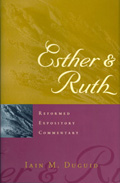
Iain M. Duguid
Reviewed by: Arthur J. Fox
Esther and Ruth (Reformed Expository Commentary), by lain M. Duguid. Published by P&R Publishing, 2005. Hardback, 201 pages, list price $17.99. Reviewed by Pastor Arthur J. Fox.
lain Duguid, professor of Old Testament at Westminster Seminary California, has written a pair of commentaries in one volume on the two books in the Bible named for women. His approach to each is unique and bound to stir discussion.
The book of Esther poses an interesting problem. Why is there no mention of God or prayer? One explanation is that the reader is expected to assume the presence of God in providence.
Duguid posits a different explanation: the Jews in general and Esther in particular were keeping quiet about their religious heritage in order to blend in, survive, and thrive in the Persian Empire. Eventually, of course, Esther had to reveal her identity. Duguid would have the reader conclude that this hiding of her Jewish background led her to utter a cry of despair when she entered, unbidden, into the court of Ahasuerus to plead for her people: "If I perish, I perish." Says Duguid, "Esther's speech is a statement of resignation to the inevitable, rather than robust faith, a whimper rather than a bark" (p. 52).
Duguid calls upon us to see Christ as the true deliverer of his people, with Esther and Mordecai being imperfect types. He also warns us not to compromise in order to fit in with the world. His explanation of the silence of Esther with regard to God's name and prayer makes sense.
The book of Ruth comes next under his scrutiny. Duguid points to Naomi as the pivotal figure whose choices betrayed a lack of faith in the Lord. As a consequence, she returned to the Promised Land as a widow who had also lost her two sons. She also returned with the widow of one of those sons, Ruth. You know the story of how the Lord used Ruth to show Naomi his covenant faithfulness. But Duguid takes a unique view
of Naomi's initial relationship with Ruth. He says that, though Ruth confessed faith in the Lord God of Israel, Naomi seemed to ignore her daughter-in-law because she reminded her of the sin she committed in leaving Israel for Moab (p. 155). Duguid comments, "Having listened to one of the most emotionally moving speeches in the whole Bible, in which Ruth pledged herself completely to Naomi, she could make no response other than a hard silence" (p. 143). He also notes her cry that she had returned home empty, thus discounting Ruth's presence. Duguid's explanation of Naomi's ignoring of Ruth is interesting, but seems a bit too speculative. Perhaps the narrative is simply focusing on Naomi's lack of faith. At any rate, Duguid's thesis demands some careful thought.
These two commentaries are refreshing in their drive to bring fresh light to familiar stories. Duguid attempts to bring a redemptive-historical perspective to both books, but at times the attempts to relate the narratives to Christ seem a bit forced. The commentaries could also use a bit more of a devotional tone to them. Still, Esther and Ruth would be a useful addition to any biblical library.
December 14, 2025
December 07, 2025
November 30, 2025
November 23, 2025
November 16, 2025
November 09, 2025
November 02, 2025
© 2025 The Orthodox Presbyterian Church